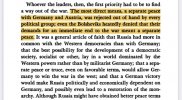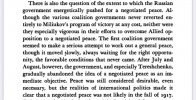Apologies for the delay in answering. Got stranded in the wrong city returning from vacation (fun with kids under 5) and have been trying to catch up since I finally got back.
I forgot to respond to this the first time through. So I will have a go at it now. Spotting tripods were used right from the first bombardment missions in August 1915. These missions were not delayed by the need for spotting, but by the need to wait for the 12” gunned monitors to arrive. And though the tripods continued in use throughout the war for bombardment, they were actually used less later on, when ranges increased, as accurate systems of aerial spotting were worked out.
If the port is required for channel naval support or cross channel logistical flow? Then absolutely I would keep the force there. That is their job, and if it cannot be done from elsewhere then absolutely you accept the risk of operating from Dover. You take what precautions you can, and move out what you can perhaps, but you do what is required of you.
That’s a good picture of docked motor launches in the Camber, a tidal dock as part of the Eastern Dockyard for launches, pinnacles, and tugs. It’s not really a good view of the Port of Dover as a whole. Here is an artists view of the port in 1914:
And for reference, here is one of the harbour in 1944, while bombardment was a threat:
Download this stock image: 1944: Smoke drifts across Dover harbour, Kent. In the foreground are belts of barbed wire used as part of the British coastal defences. Both naval and civilian craft can be seen. Picture part of PA Second World War collection. - G58YFG from Alamy's library of millions...

www.alamy.com
Here is another from a German recon photo. It’s harder to see but you can make out the blips of ships in the harbour:
Download this stock image: Port of Dover - Kent 20th November 1939 - BMYD4A from Alamy's library of millions of high resolution stock photos, illustrations and vectors.

www.alamy.com
Dover was under greater threat from 1940-1944 than it was from 1914-1918, yet it remained active. Because it was required.
You misunderstand me. The Germans
did attempt to encircle Fifth Army. When von Bulow’s 2nd Army was initially held by Lanzerac’s Fifth Army he requested that von Hausen’s 3rd Army join in the attack with the intent to execute a pincer. Logistics is not the reason that von Bulow did not try to encircle Fifth Army, since he did try, but logistics did contribute to the failure to do so.
Logistics can be broken down into levels. For WW1 I tend to consider 3 levels. The first is national logistics, which is basically the home fronts ability to produce required goods and transport them to the rear area logistics hubs. Germany was deficient in this compared to its enemies as a whole, and this drove the focus on battles of annihilation. However, this difference did not become acute in 1914, so we can ignore it for this question.
The next level is theatre logistics, or getting from the rear area logistics hubs to the rail head. This is an interesting one in 1914 since it was, on the one hand, very well managed. And yet, on the other hand, it is here where the problems truly lie. One thing Schlieffen got right was that he closely integrated the Reich Railway Service with the General Staff. The Rail service was well prepared to carry out the latest version of the GGS’s plans, and railway corps for operating and repairing railways were established pre-war. The German Army did a very good job operating railways in 1914.
However, to achieve the speed required through Belgium certain things were dropped. Below is a map of the rail lines that supplied 1st, 2nd and 3rd Armies on 5th Sept:
View attachment 836096
The main modification for 21-23 Aug is that Namur had not yet surrendered. Which means that the line from Liege to Charleroi is not available to 2nd Army’s troops at Charleroi. This means that in addition to 1st, 2nd and 3rd Armies’ supply lines (as well as part of 4th Army’s) all going through Liege, 1st and 2nd Army had to share the line on to Louvain (though some amount may have been able to be diverted over the single track line at Landen). In order to make this work, and relieve the congestion, certain classes of supplies were simply not carried by the trains, fodder being the most pertinent here.
Finally there is the logistical train from the rail head to the troops. This was where the problems came to roost. Heavy and organic motor transport companies did exist but were very quickly proved inadequate. The bulk of the supply transportation would be by horse. Losing the fodder from the trains saved over 1.5 million lbs per day, or 1 and a third 50 wagon trains, in 2nd Army alone. But, as mentioned earlier, the lack of provided fodder led to sickness and losses in the horses. With the reduced capacity to transport from the railhead, the 18-24 km a day required by the schedule became problematic when the railheads could not be moved up quickly enough. This reduces the combat effectiveness of the formation as artillery and sometimes the machine guns can’t keep pace and when they do there is often a limit on ammunition available.
To be clear, I am not saying that this stopped the Germans from advancing on Fifth Army in late August, but it would make advances 25-50% greater than OTL’s already impressive ones (which is what you are advocating here), while facing determined resistance, highly unlikely. It would also increase the buildup of problems in the rear areas as the troops would be even farther from their supplies. This would most likely cause the German Army to hit the end of its logistical rope sooner than OTL.
Logistics collapse is one of those “suddenly all at once” kind of problems.
Feel free. The German Staff did a great many things very well. Detailed planning and scheduling were almost their hallmarks. However, be aware that the subjugation of logistical reality to strategic requirements also seems to be a German Staff trait. And it was one that destroyed them.





